Positive or negative customer interactions with a utility company have lasting effects on its bottom line. Consumers have long memories when it comes to the service they receive, the renewal price they’re offered, and any disruption they experience. So it pays to invest in the customer relationship.
All of these interactions can be better organized with a CRM for utility companies. By placing customer relationship management front and center of everything you do, your utility company can enjoy a positive reputation by keeping the people in its service area happy and loyal.
This guide introduces what a CRM for utilities is, must-have features to look out for, and 15 of the best platforms in the market, including monday CRM.
Try monday CRMWhat is a CRM for utilities?
A CRM for utilities is a customer relationship management system designed to collect, store, and analyze customer data within the context of a utility company. It allows energy, water, gas, and waste management providers to manage important data points for maintaining quality customer relationships. These might include:
- Contact details
- Service history
- Billing information
- Field service data
- Energy usage
- Trade ally transactions
- Product adoption
The best CRM options provide additional features to help your utility company save time, streamline work processes, and reduce error risks.
Best CRM for utilities at a glance
Here’s a high-level overview of the best utilities CRM software in the industry. It’s a great jumping-off point as you begin to research the merits of different vendors:
| Best for | Best feature | Starting price | |
|---|---|---|---|
| monday CRM | Utility companies seeking a powerful, no-code, user-friendly solution | AI assistant delivering personalized customer experiences at speed | From $12 per user/mo |
| Salesforce CRM | Large utilities needing AI-driven insights | Customer 360 view with Einstein AI | From $25 per user/mo |
| Zoho CRM | Small to mid-sized utilities prioritizing affordability | Flexible integrations with Zoho ecosystem | Free plan for 3 users |
| Zendesk | Customer support-focused utilities | Advanced ticketing and omnichannel tools | From $19 per user/mo |
| Creatio | No-code customization and end-to-end automation | Automated workflows and omnichannel marketing | From $25 per user/mo |
| HubSpot CRM | Smaller utilities needing free CRM tools | Centralized dashboard and live chat software | Free plan for 5 users |
| Oracle NetSuite CRM | Large-scale utilities seeking ERP and CRM integration | Visual analytics and sales force automation | Pricing unavailable |
| Freshsales | Simple CRM with automation and lead scoring | AI-powered contact lifecycle and segmentation | Free plan for 3 users |
| Sage CRM | Integrated financial and operational management | Real-time insights and MailChimp integration | From $39 per user/mo for cloud pricing |
| Microsoft Dynamics CRM | Utilities needing integration with Microsoft tools | AI-driven insights and field service management | From $65 per user/mo |
| Sugar CRM | Utilities requiring flexibility and analytics | Predictive analytics and customizable workflows | From $19 per user/mo |
| Priority ERP | ERP-CRM hybrid for sales, service, and inventory | Comprehensive lifecycle management | Pricing unavailable |
| Pipeliner CRM | Sales teams needing a visual pipeline tool | Custom user interfaces and automations | From $65 per user/mo |
| NetHunt CRM | Gmail-integrated CRM for email-heavy utilities | Looker Studio reports and priority filters | From $24 per user/mo |
| Cronberry | Tailored solutions for personalized customer interactions | SMS automation and campaign performance tracking | Pricing unavailable |
5 benefits of using utilities CRM software
Companies in the utilities industry enjoy the following benefits of an investment in customer relationship management:
Boosting operational efficiency
A quality CRM is a central workspace where all the threads of your utility company come together in one place. Multiple teams collaborate, ensuring everyone’s on the same page. For example, you might use customer data stored in the CRM to influence your winter energy marketing campaigns, call center scripts, and billing practices. This consistency leads to more successful operational and sales processes that keep a strong customer base.
Improving the customer experience
At its core, a CRM focuses on the most critical people in the utilities sector—its customers. By storing individual customer information, utility companies can deliver personalized communication relevant to their particular stage in the customer journey, whether they’ve just discovered you or been with you for years.
For example, you might tag your CRM to notify your customer service representatives that a new customer has signed up. They’ll use this information to deliver a highly personalized service during onboarding. Alternatively, you might use your CRM to detail all communication with a customer experiencing a billing issue. Keeping a log of all interactions enables your team to achieve a proactive problem resolution faster.
Delivering faster quotes
When prospects arrive on your radar, a CRM keeps everything organized so you can quickly provide them with what they’re looking for—information. Sales representatives in the utility industry can quickly review the CRM, understand what offers or discounts are available, and provide an enticing quote. This efficiency keeps your prospects from looking elsewhere and helps you close more deals faster.
Reducing customer churn
Customer retention is a huge challenge in the utility sector due to rising energy prices and stiff competition. Some markets have experienced a 60% surge in customers switching rates due to the hike in energy prices. To prevent churn and boost customer loyalty, energy companies can use their CRM to track customer usage and send personalized offers or notifications when prices may increase. This proactive approach is more likely to build long-term customer relationships and improve overall company satisfaction.
Identifying upsell opportunities
There’s no one better to sell to than existing customers. They already trust and believe in your service business; they know how to access your customer portal or contact support and are comfortable with your invoicing cycle.
A CRM makes it easy for sales representatives to identify potential upsell opportunities by tracking customer usage, product adoption rates, and interactions with the company. By doing so, you’ll increase your revenue per customer, and ultimately, your bottom line.
What are the must-have features for utility CRM software?
To get the most value from your CRM for utilities, you’ll need specific features to enhance your customers’ experience. Here are some top features to look out for:
Compliance and security
Utility providers carry a huge amount of sensitive customer data, including names and addresses, financial information, and energy usage. To avoid data breaches and remain compliant, it’s vital to choose a CRM with advanced security features. These might include encryption, two-factor authentication, and role-based access control.
Automation capabilities
Successful utility companies are built using effective, repetitive workflows at every customer lifecycle stage. Pre-sales, this might involve putting together a meaningful sequence of activities to nurture the interest of any leads and convert them into paying customers. Once onboarded, your workflows may involve sending out regular marketing content, responding to queries, and setting up billing cycles.
CRMs with automation capabilities will shave hours off these routine tasks, processes, and approvals, winning back time to invest in other business areas.
Business tool integrations
Extend the value of your CRM by integrating it with other key tools you use to run your utility business. For example, you might sync your CRM with a customer service management platform like monday service to deliver exceptional customer experiences. Alternatively, you might integrate with communication software such as Gmail or Slack to keep all customer correspondence aligned and accessible from a central location.
Reporting and analytics
Tracking and managing analytics and key performance indicators (KPIs) is crucial, but so is being able to view that aggregated data in the best way for you. The right CRM will offer a range of dashboard views to present those valuable insights and clearly identify customer behavior patterns that shape your sales and marketing techniques.
15 best utilities CRM software
The list below describes the main features and pricing information of the following CRMs for the utility industry
1. monday CRM
Best for: Utility companies of any size seeking a no-code, user-friendly CRM to streamline sales processes, boost customer relationships, and scale operations efficiently
monday CRM is a powerful, intuitive platform designed to help revenue teams streamline workflows and enhance efficiency throughout the customer journey. Its flexibility and seamless integration with the larger monday.com product suite make it ideal for any utility company or energy supplier looking to scale their sales with a unified system.
Unlike legacy CRM systems, you won’t require deep technical expertise or coding knowledge to set up our platform. Instead, our no-code tools give utility companies flexible building blocks to grow their revenue faster and exceed customer expectations.
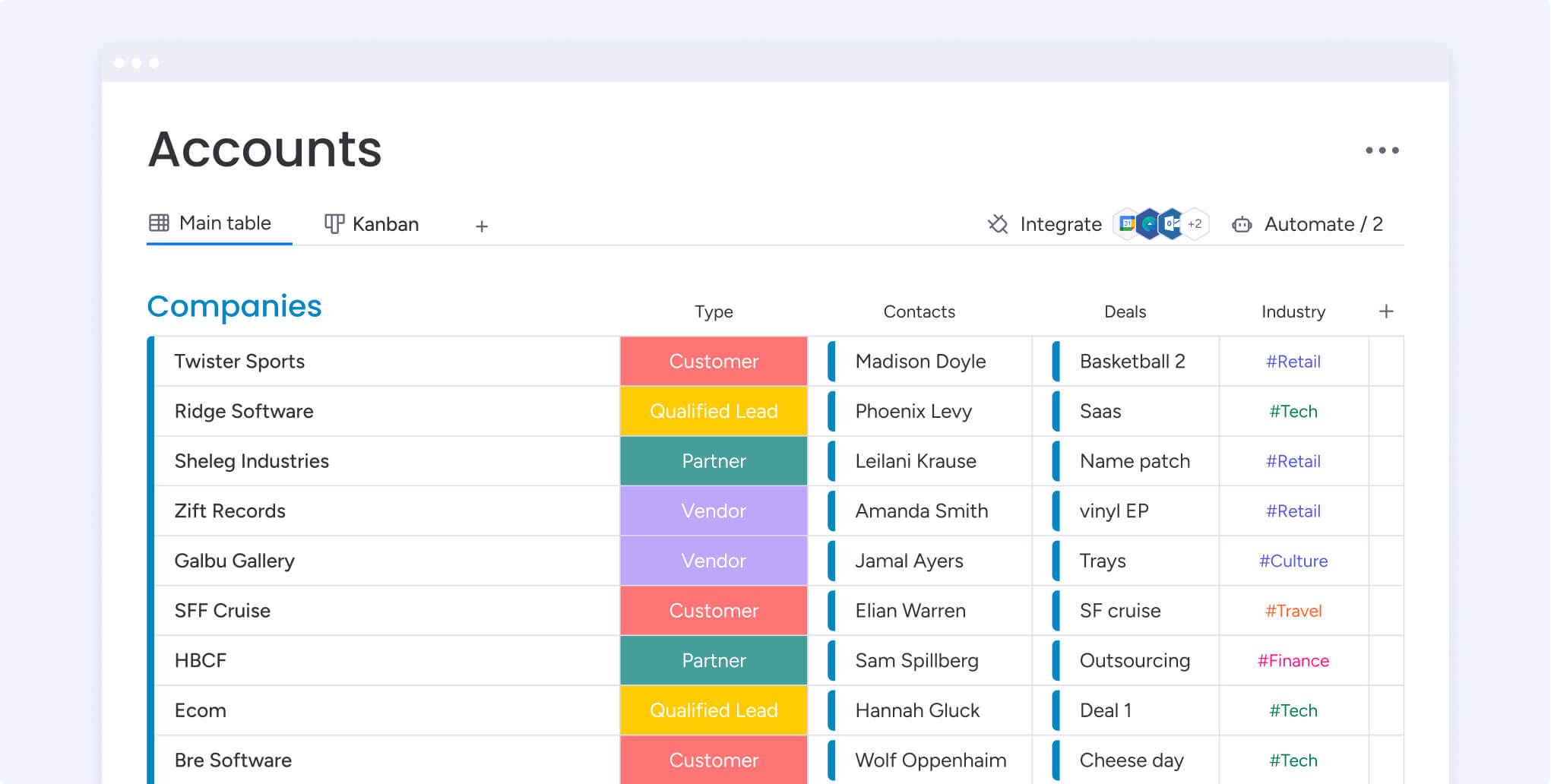
monday CRM features
- Boost team productivity with customizable dashboards and automated workflows tailored to unique sales processes.
- Enhance collaboration and visibility by displaying all customer information and activity in one place, ensuring teams stay aligned.
- Extend efficiency beyond sales with powerful integrations and access to monday work management and monday service platforms to unify key business processes.
- Streamline deal flow using a drag-and-drop pipeline, automated reminders, and custom statuses to track progress and ensure no deal slips through the cracks.
- Improve decision-making with real-time analytics and reports, giving you a clear view of team performance, pipeline health, and revenue projections.
monday CRM pricing
From $12 per user/mo based on annual pricing. Free trial available.
Try monday CRM2. Salesforce CRM
Best for: Large utility companies needing AI-driven insights
Salesforce offers an AI-based CRM that helps utility companies build relationships across the entire customer lifecycle. The platform encompasses marketing, IT, sales, commerce, and service operations.
Salesforce features
- Einstein 1, its AI-integrated platform
- Customer 360 delivering an overview of every customer
- Data Cloud to create a single source of truth
Salesforce pricing
From $25 per user/mo with an annual plan.
3. Zoho CRM
Best for: Small to mid-sized utilities looking for an affordable CRM
Zoho CRM could be a strong option if you’re already familiar with other products within the parent ecosystem, such as Zoho Mail or Zoho Social.
Zoho CRM features
- Integrations with Zoho products and external customer applications
- Sales process builder, including process rules
- Journey orchestration to better understand customer paths and behaviors
Zoho CRM pricing
Free version available for up to 3 users. The Standard Plan is $14 per user/mo for the annual plan.
4. Zendesk
Best for: Utilities focused on omnichannel communication and self-service capabilities
Zendesk Sell is a modern CRM enabling pipeline visibility. Utility company sales teams can keep their lead generation, contact management, and activity tracking information in a central location to maximize sales productivity and grow revenue.
Zendesk features
- Automation triggers to keep sales reps on target
- Personalized experiences for customers
- Zendesk Sunshine conversations between customers and sales
Zendesk pricing
From $19 per user/mo, billed annually. Free trial available.
5. Creatio
Best for: Utility companies seeking a no-code platform for end-to-end process automation and customizable workflows
Creatio is an AI-powered platform enabling utility organizations to build customized workflows without any coding knowledge.
Creatio features
- Omnichannel marketing across digital ads, email, events, etc.
- Automated customer service workflows
- No-code CRM modules
Creatio pricing
From $25 per user/mo. Free 14-day trial available.
6. HubSpot CRM
Best for: Smaller utility businesses wanting a user-friendly CRM with inbound marketing tools
The free version of HubSpot CRM could be a good fit for startup utility companies. However, most will benefit from the professional or enterprise plan that offers more advanced controls and functionality. This CRM integrates with other products within the HubSpot suite, such as marketing, ops, service, and content tools.
HubSpot CRM features
- Real-time visibility from a central sales dashboard
- Live chat software for round-the-clock customer interactions
- Email template builder
HubSpot CRM pricing
Free plan available for up to 5 users, and the Sales Hub Starter starts at $20 per seat/month.
7. Oracle NetSuite CRM
Best for: Large utility companies needing sales force automation
NetSuite may support large utility companies in streamlining key business processes and providing visibility into customer relationships and sales operations. It covers the lifecycle from lead gen to order fulfillment, renewals, upselling, cross-selling, and support.
Oracle NetSuite CRM features
- Visual analytics presented as a summary-level overview or in-depth details of specific activities
- Sales force automation
- Automated case management processes
Oracle NetSuite CRM pricing
Accurate pricing for the annual license fee is available from the vendor. A setup fee also applies.
8. Freshsales
Best for: Utility companies already using Freshworks tools
Freshsales is another AI-powered platform aimed at managing relationships with current or potential customers. It syncs with other Freshworks products such as Freshsales, Freshchat, Freshmarketer, or Freshdesk Omni.
Freshsales features
- Contact lifecycle stages
- Chat campaigns
- Customer segmentation
Freshsales pricing
Free plan available for 3 users. Growth Plan starts at $9 /user/mo, billed annually.
9. Sage CRM
Best for: Utilities looking for a CRM that integrates with financial and operational management tools
Sage CRM allows you to choose a fully integrated platform or separate modules for sales, marketing, and customer service. The tool tracks current and past interactions to move prospects through their journey or provide customers with the support they need.
Sage CRM features
- Real-time insights to identify cross-sell and upsell opportunities
- Integrations with essential tools like MailChimp for campaign management
- Team collaboration features
Sage CRM pricing
From $39 per user/mo for the cloud version. On-premise pricing is available from the vendor.
10. Microsoft Dynamics CRM
Best for: Large-scale utilities requiring integration with other Microsoft products
Microsoft Dynamics 365 CRM enables utility companies to manage their customer relationships, automate processes, and gain actionable insights. Designed for scalability, it integrates seamlessly with other Microsoft tools.
Microsoft Dynamics CRM features
- AI-driven insights for personalized customer interactions
- Robust field service and case management tools
- Seamless integration with Office 365 and Power BI
Microsoft Dynamics CRM pricing
The Dynamic Sales 365 Professional plan is available from $65 per user/mo. Free trial available.
11. SugarCRM
Best for: Utilities requiring a CRM focused on analytics
SugarCRM is a flexible platform utility companies may use to manage customers and enhance service delivery. AWS powers its AI-powered dashboard.
SugarCRM features
- Predictive analytics to anticipate customer behavior
- Unified view of customer activities, history, and records from one screen
- Drag-and-drop workflows
SugarCRM pricing
From $19 per user/mo with an annual plan.
12. PriorityERP
Best for: Utilities seeking an ERP and CRM integrated system to manage customer relationships, inventory, and field services.
Priority ERP isn’t just an enterprise resource management platform; it also enables utility companies to track and optimize sales with complete customer lifecycle management.
PriorityERP features
- Lead and opportunity management
- Pricing, quotes, and orders
- Customer surveys and account management
PriorityERP pricing
Accurate pricing is available from the vendor.
13. Pipeliner CRM
Best for: Utility sales teams who need a visual pipeline management tool
Pipeliner CRM is aimed at mid-sized, large, and enterprise companies, making it ideal for most utility customers. It uses Pipeliner Voyager AI-Gen 2 and claims to put the “R” back into CRM.
Pipeliner CRM features
- Built-in automation engine, the Automizer
- Personalized user interfaces with a Bottom Navigation picture frame
- Power Panel, including sales units, user profiles, and more
Pipeliner CRM pricing
From $65 per user/mo. Free trial available.
14. NetHunt CRM
Best for: Utilities that rely heavily on email communication
NetHunt is a customer relationship management platform for sales and marketing teams that integrates with key tools like Gmail.
NetHunt CRM features
- Looker Studio, a space to pull in data and build real-time reports
- Centralized pipeline views with priority filters
- Automations for key sales processes
NetHunt CRM pricing
From $24 per user/mo. Free trial available.
15. Cronberry
Best for: Utility companies looking for a CRM with customer service features
Cronberry is a marketing automation and lead management software providing insights into customer trends, allowing businesses to respond with personalized campaigns.
Cronberry features
- Customer profiles for personalized interactions
- SMS automation to support customer relationships
- Real-time analytics to track marketing campaign performance
Cronberry pricing
Accurate pricing is available from the vendor.
monday CRM: the best CRM for a utility business
monday CRM is a powerful workspace that delivers customer satisfaction at every stage of the journey. Our exceptional CRM platform enables utility companies to sync customer relationships with other essential processes like account management and payment tracking. Here’s how our advanced features set monday CRM apart from the rest:
- Grow your utility business faster with pre-built boards for pipeline, leads, contacts, and accounts management. Customer acquisition will be quicker and smoother using our fully customizable templates to map out your workflows with half the legwork already done. These entity boards are all synced, so updates are reflected across all connected boards.
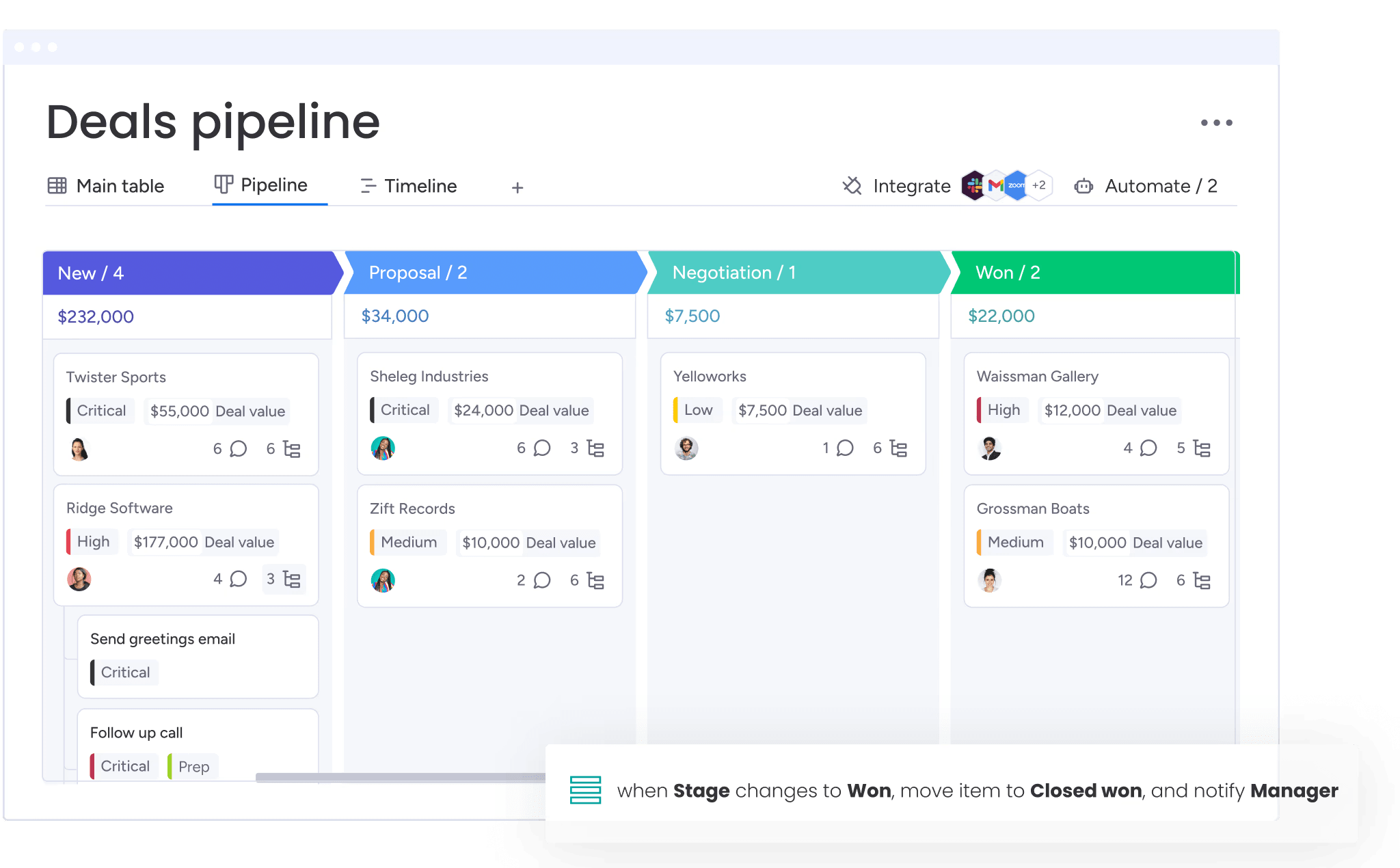
- Capture essential data at a glance using interactive dashboards that display crucial info you need using drag and drop functionality. Choose your own mix of widgets and columns to deliver a 360-degree view of your customers, your sales, your pipeline, and anything else you need.
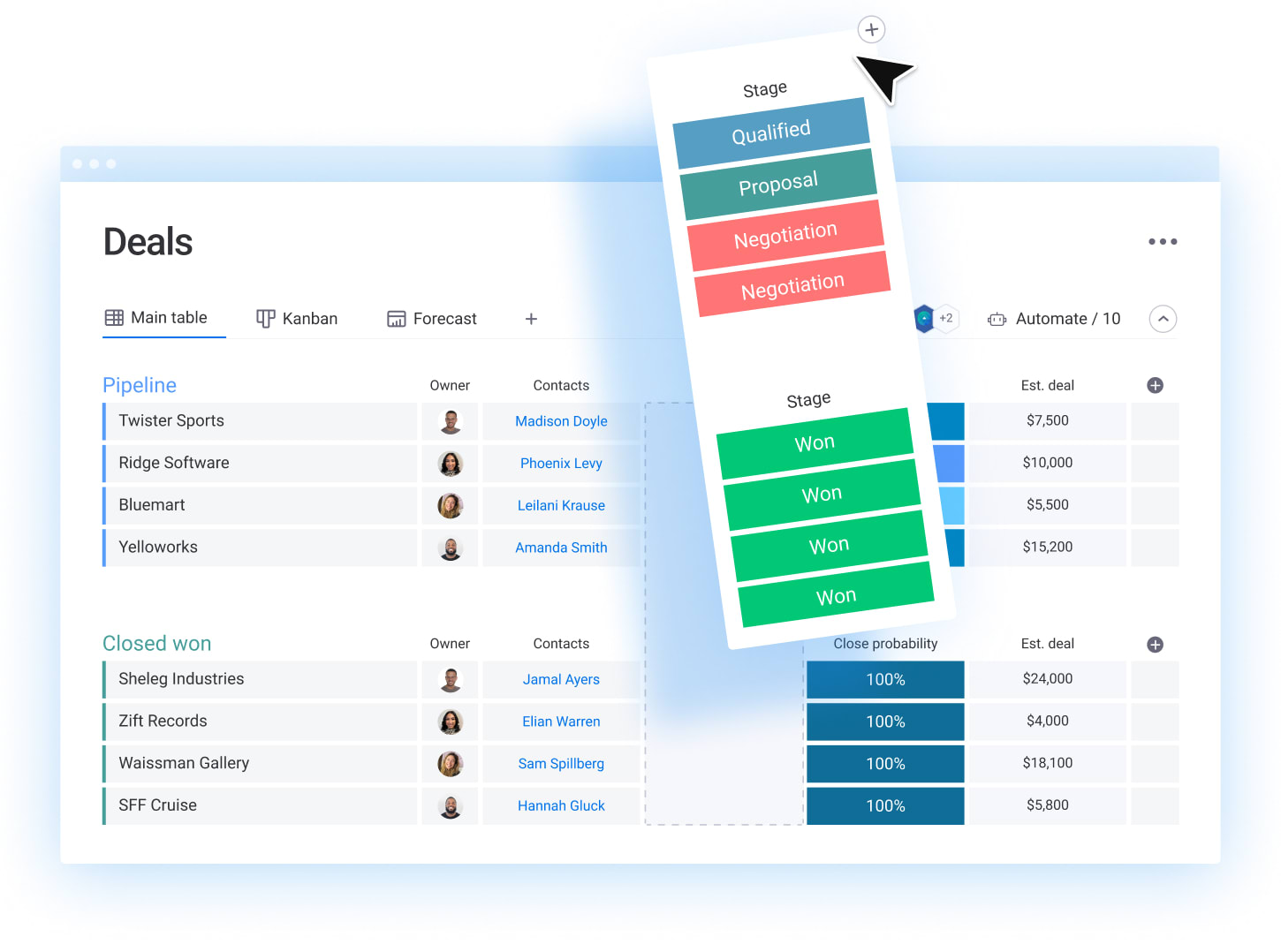
- Enjoy working from a user-friendly interface. monday CRM goes beyond satisfying your customers; it also provides your internal team members with a platform they’ll actually look forward to every day. It’s highly intuitive, so your users will hit the ground running without the need for any extensive training or onboarding. But if you run into any snags, we’re known for our excellent customer service, available 24/7.
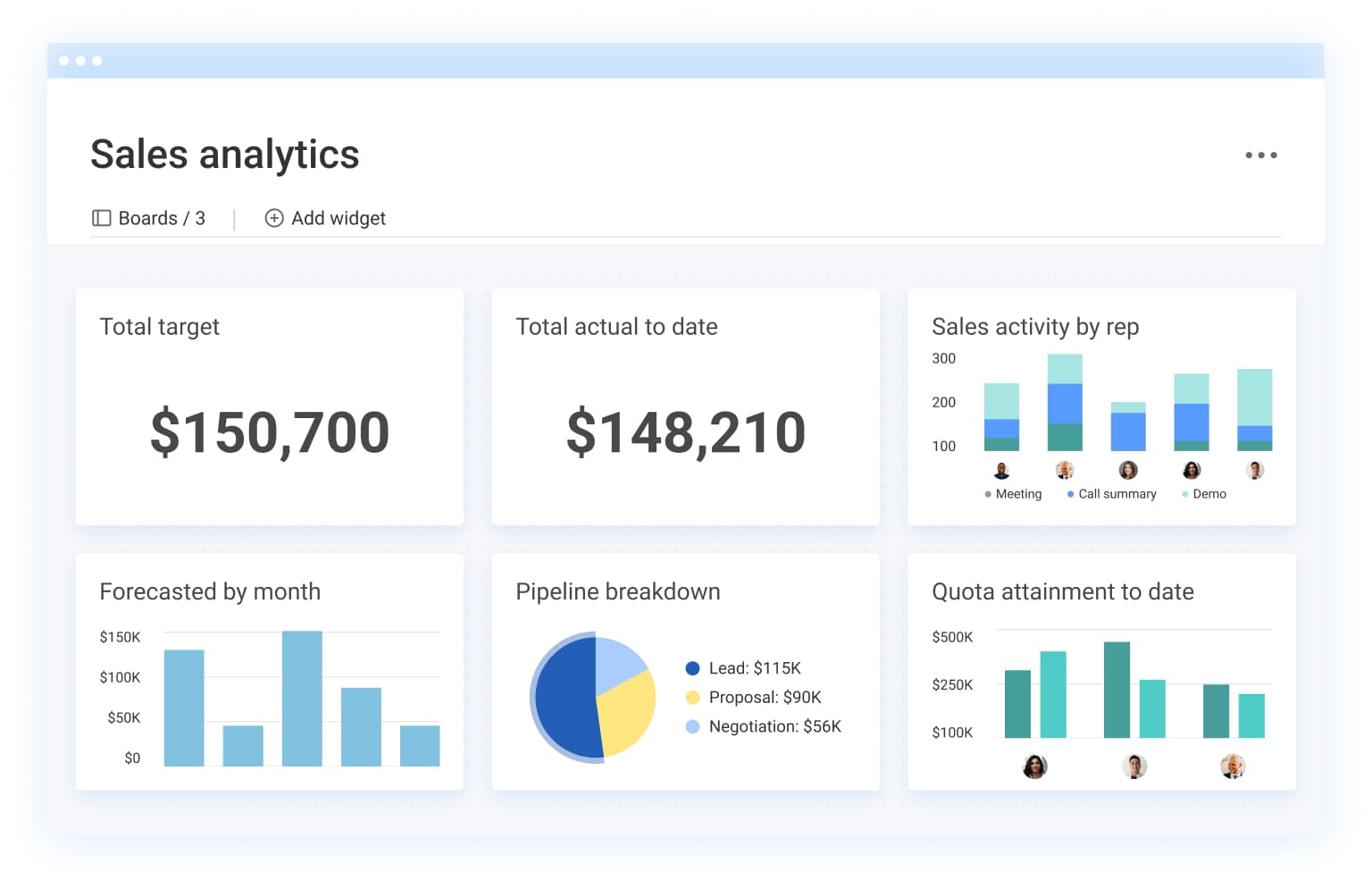
- Optimize your customer experience processes through repetitive task automation. You’ll choose three elements to create your own no-code workflows: triggers, conditions, and actions. For example, when a customer sends an email (trigger) to a support desk address (condition), you’ll provide them with an automated notification response (action) confirming a customer support representative will contact them within 1 working day.
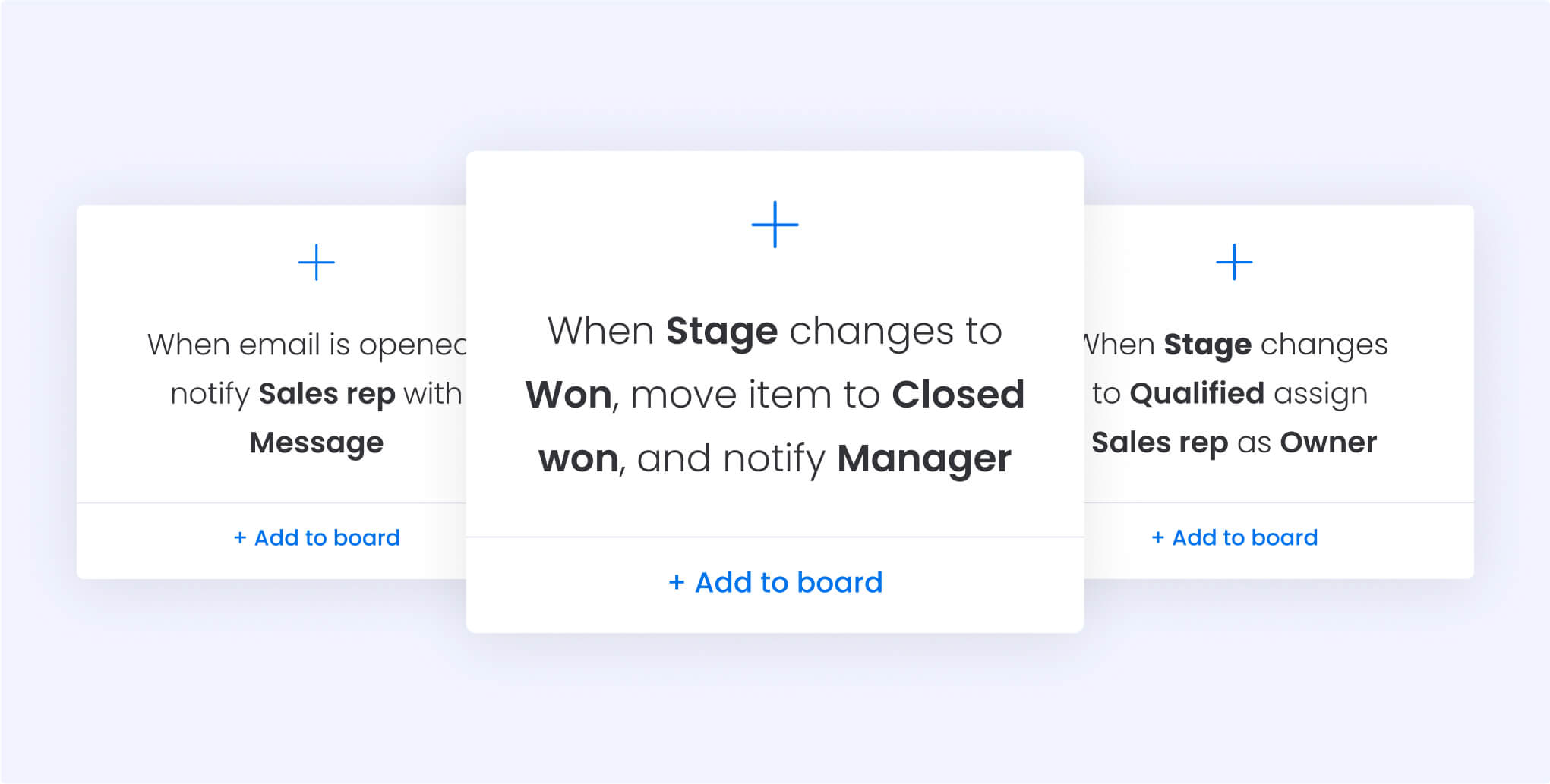
- Use artificial intelligence to further enhance customer engagement. monday AI assistant allows you to segment customers and send personalized marketing content that resonates with them. For example, you might use AI to whip up an email to all customers due to renew within the next 60 days.
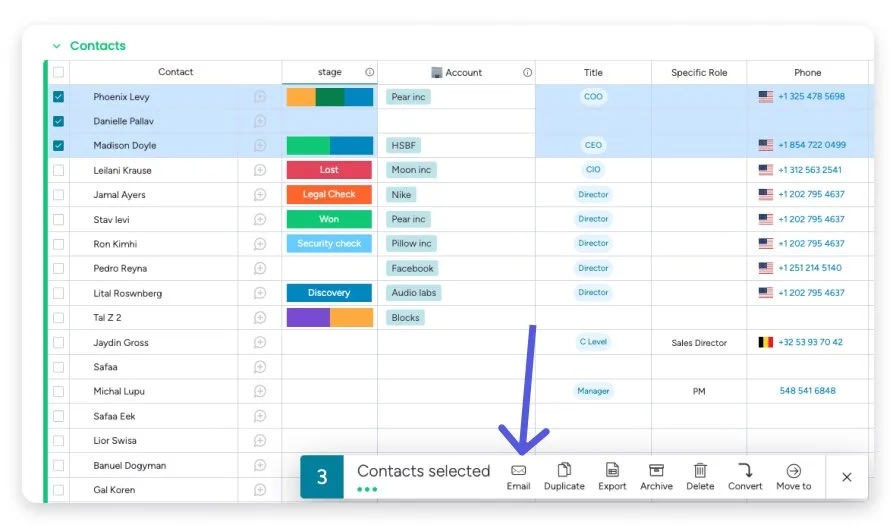
Before choosing the best CRM for your utility business, we’d recommend consulting real-life reviews of customers like you to understand how they experience a particular platform. We’re delighted that monday CRM receives a high rating of 4.6 out of 5 from the G2 software community, achieving impressive scores of 9 out of 10 in the Ease of Use, 8.6 for Ease of Setup, and 9 for Ease of Admin categories.
monday CRM will streamline operations and improve customer relationships at your utility company. Take a free trial today and experience our platform firsthand.
Try monday CRM Get started
Get started 
